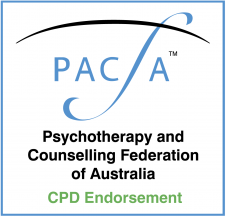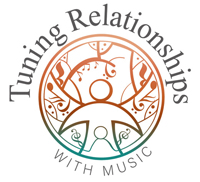Training in Tuning Relationships with Music® is available to professionals who are working therapeutically with parents who have experienced trauma and their children. Professionals need to be qualified or studying toward qualification in a discipline that entitles them to achieve registration with a relevant professional body e.g., the Psychotherapy and Counselling Federation of Australia, The Australian Association of Family Therapy, The Australian Music Therapy Association, the Australian Counselling Association, the Australian Psychological Society or similar.
There are three levels of training.
Level One: Webinars and Pre-Reading (8 hours)
This introductory webinar series provides a detailed orientation to the theory and research underpinning Tuning Relationships with Music® (TRM), and an introduction to using musical exercises to assess nonverbal aspects of parent-child interaction, including when they are in conflict.
What is covered:
- Research/evidence: Why is nonverbal communication important?
- Research/evidence: Additional nonverbal communication challenges for families with a trauma history
- Using music to clinically observe nonverbal interaction
- Using music to clinically observe nonverbal aspects of conflict interaction
- Emotion Coaching in TRM
- Family assessment and therapy skills used in TRM
Learning outcomes:
- Understanding of relevant theories, existing evidence-base and where gaps are when working with parent-adolescent conflict where the parent has a history of abuse or neglect
- Learning about the rationale for using music as a way to address implicit somatic and emotional interpersonal processes that drive conflict within a systemic framework.
- Introduction to ways music may therapeutically address issues faced by traumatised families
- Learning about Emotion Coaching with particular attention to how this is used in TRM
- Learning assessment skills specific to working with families
- Introduction to emotion-focussed and attachment -based family therapy skills with an emphasis on how these are used in TRM.
Level Two (24 hours)
Level Two provides detailed information about the structure and principles of TRM, and in-depth training in how to deliver the therapy. A clinician manual is included, which includes demonstration videos of each music exercise.
What is covered:
- Learning how to conduct music-based assessments of parent-child interaction and conflict interaction, and how to use this information to inform therapeutic intervention
- Introduction and overview of Tuning Relationships with Music®
- Sessions 1-8 (didactic and experiential learning how to conduct these sessions)
- Case applications and adapations of TRM for other client groups.
Learning outcomes:
- Learning the key tasks and 8 sessions of Tuning Relationships with Music®.
- You will be able to deliver the intervention to families.
Level Three
Supervision
Graduates of Level Two training are invited to participate in a regular supervision group where cases are discussed and skills are reviewed and practised in a supportive context. Groups are available online via zoom. Individual supervision is also available.
Supplementary learning
For non-musicians/non-music therapists, we recommend that you attend Rhythm2Recovery's 2-day course to build confidence and knowledge about how to use percussion instruments more generally within the counselling context.
Accreditation
Participants are required to submit a video of their work using TRM with a family to be assessed for accreditation in the method.
Training is endorsed by the Psychotherapy and Counselling Federation of Australia (PACFA) for 34 CPD points.

